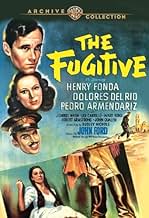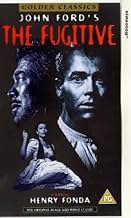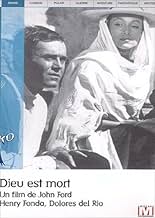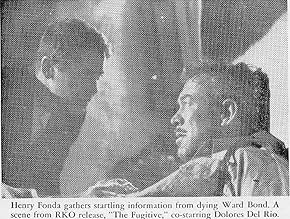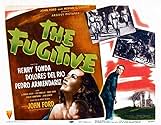PUNTUACIÓN EN IMDb
6,3/10
2,7 mil
TU PUNTUACIÓN
En el estado mexicano de Tabasco, el sentimiento anticlerical lleva a un gobierno revolucionario a perseguir a los curas.En el estado mexicano de Tabasco, el sentimiento anticlerical lleva a un gobierno revolucionario a perseguir a los curas.En el estado mexicano de Tabasco, el sentimiento anticlerical lleva a un gobierno revolucionario a perseguir a los curas.
- Dirección
- Guión
- Reparto principal
- Premios
- 1 premio y 2 nominaciones en total
Dolores Del Río
- An Indian Woman
- (as Dolores Del Rio)
Pedro Armendáriz
- A Lieutenant of Police
- (as Pedro Armendariz)
Chris-Pin Martin
- An Organ-Grinder
- (as Cris-Pin Martin)
Miguel Inclán
- A Hostage
- (as Miguel Inclan)
Fernando Fernández
- A Singer
- (as Fernando Fernandez)
Rodolfo Acosta
- Policeman
- (sin acreditar)
Mel Ferrer
- Father Serra
- (sin acreditar)
Jack Pennick
- Man
- (sin acreditar)
José Torvay
- Mexican
- (sin acreditar)
Reseñas destacadas
John Ford's adaptation of Graham Greene's "The Power And The Glory" captures perfectly the potential for the seven deadly sins in all of us. It is an incredibly and understatedly raw and emotional and downright earthy movie. The entire supporting cast is brilliant, and Fonda, of course, is excellent, if not precisely ideal. This is in all senses, a quintessential study in soul-searching.
Move over, Harrison Ford; your namesake John got here first. While comparisons with Andrew Davis' action-packed 1993 thriller are inevitable in discussing 'The Fugitive (1947),' the two films aside from the similarity described in their shared title are completely unrelated, and about as different as two films could possibly be. Unlike many of the Westerns that brought director John Ford his greatest fame, 'The Fugitive' is entirely unconcerned with any form of action or dialogue; Ford's film-making is so concentrated on establishing the correct emotional atmosphere for each scene that it occasionally strays into tedium. However, it was obviously a very personal project for the Ford who once called it "perfect" and it's difficult to criticise a film into which the director poured so much passion and resolve. The story was adapted from Graham Greene's 1940 novel, "The Power and the Glory" {a.k.a. "The Labyrinthine Ways"} and concerns the plight of a victimised Christian priest, in an unnamed Latin American country where religion has been outlawed.
Perhaps the film's greatest weakness, from my reasoning at least, is that it is so concerned with painting each character as an icon or ideal (few characters are afforded names, and are instead credited with indefinite articles; "a fugitive," "a lieutenant of police," "an Indian woman") that it's hard to sympathise with them. Fortunately, while consistently attempting to maintain each character as a "timeless" figure in the film's ageless story, Dudley Nichols's screenplay avoids the usual stereotypes to which most amateur filmmakers would inevitably resort. The Fugitive (Henry Fonda) is not a courageous, humble pillar of human decency, but a misguided clergy driven by an unconscious self-pride; his adversary, the Lieutenant of Police (Pedro Armendáriz), loves his country and its people deeply, but, guided by a fierce blind patriotism and an illogical hatred of religion, he is often misled towards acts of sheer barbarity. The Police Informer (J. Carrol Naish) is a Judas-like character, betraying The Fugitive to the authorities, and becoming inescapably repentant at the thought of his inhumanity.
Despite not being particularly religious myself, I was sufficiently moved by Christianity's noble plight for survival, though I wasn't overly fond of the film's ultimate assertion that the lieutenant's hatred of religion stems directly from his secretly believing in God but being unwilling to admit it. Nevertheless, if you're going to watch 'The Fugitive,' it will most certainly be for the photography, which is, captured by Mexican cinematographer Gabriel Figueroa, indescribably breathtaking. The opening sequence, in which The Fugitive returns to his former church, the light streaking through the windows as though God himself is reaching into the forsaken depths of the building, is spellbinding in its beauty. While Armendáriz is charismatic, and even slightly sympathetic, in his role of the antagonist, Henry Fonda largely looks awkward in the lead role (though you could argue that this uneasiness is integral to his character), and most of the other players perhaps due to a language barrier are similarly stilted. A visual masterpiece this film may be, and certainly an overall interesting watch, but 'The Fugitive' remains inferior Ford.
Perhaps the film's greatest weakness, from my reasoning at least, is that it is so concerned with painting each character as an icon or ideal (few characters are afforded names, and are instead credited with indefinite articles; "a fugitive," "a lieutenant of police," "an Indian woman") that it's hard to sympathise with them. Fortunately, while consistently attempting to maintain each character as a "timeless" figure in the film's ageless story, Dudley Nichols's screenplay avoids the usual stereotypes to which most amateur filmmakers would inevitably resort. The Fugitive (Henry Fonda) is not a courageous, humble pillar of human decency, but a misguided clergy driven by an unconscious self-pride; his adversary, the Lieutenant of Police (Pedro Armendáriz), loves his country and its people deeply, but, guided by a fierce blind patriotism and an illogical hatred of religion, he is often misled towards acts of sheer barbarity. The Police Informer (J. Carrol Naish) is a Judas-like character, betraying The Fugitive to the authorities, and becoming inescapably repentant at the thought of his inhumanity.
Despite not being particularly religious myself, I was sufficiently moved by Christianity's noble plight for survival, though I wasn't overly fond of the film's ultimate assertion that the lieutenant's hatred of religion stems directly from his secretly believing in God but being unwilling to admit it. Nevertheless, if you're going to watch 'The Fugitive,' it will most certainly be for the photography, which is, captured by Mexican cinematographer Gabriel Figueroa, indescribably breathtaking. The opening sequence, in which The Fugitive returns to his former church, the light streaking through the windows as though God himself is reaching into the forsaken depths of the building, is spellbinding in its beauty. While Armendáriz is charismatic, and even slightly sympathetic, in his role of the antagonist, Henry Fonda largely looks awkward in the lead role (though you could argue that this uneasiness is integral to his character), and most of the other players perhaps due to a language barrier are similarly stilted. A visual masterpiece this film may be, and certainly an overall interesting watch, but 'The Fugitive' remains inferior Ford.
Graham Greene is one of the literary greats, and while the book 'The Power and the Glory' that 1947's 'The Fugitive' is based on is not one of my favourites of his and one can totally see why it was controversial at the time it is an interesting read. John Ford was a truly fine director, one of the best at that time, known for some of the finest Westerns around and he excelled too in non-Westerns (i.e. 'The Quiet Man'). The cast is an interesting one, Henry Fonda being the best known.
'The Fugitive' adaptation-wise is a loose one, and the censorship the film had to endure dilutes the impact somewhat. Two of the biggest differences being Fonda's character being no longer being an alcoholic and the central relationship not being sexual, which if included would have the film quite bold. If included though, it would have made it as divisive as the book. On its own terms, 'The Fugitive' didn't wow me and the potential was there for it to have been a much better film. But it was still not bad at all, actually thought that it was quite good, and there are a fair share of note-worthy good elements.
Coming off best of the many good things is Gabriel Figueroa's outdoor photography. Which is really quite miraculous, so many of the shots leave one in wonder in their beauty and varied technical skill. Oh and the outdoor locations are just stunning. The haunting score doesn't feel too constant or in your face, having the right mood throughout while not over-emphasising too much. Ford does show frequently how great he was as a director, at its best his direction here in 'The Fugitive' is quite masterly.
Some very thoughtful and powerful moments in the script and enough of the story compels and moves. The performances are very good, with a smouldering Dolores Del Rio (though she does have moments where she overacts) and a remarkably nuanced Fonda in a complex role being generally strong. The best performance comes from a both menacing and tortured Pedro Armendariz, who is riveting whenever he appears.
On the other hand, too much of the writing is very melodramatic to an over-cooked degree, as is Del Rio at times. Some of the pace is a bit draggy.
Do agree with those that say that the religious element of the story is very heavy-handed and at times vague. It is focused on too much and it is delivered with little subtlety, the messaging was done in a way that made me feel beaten around the head.
All in all, a lot of note-worthy things but flawed. One of those "appreciated what it tried to do" sort of films while not properly loving it, the divisiveness in opinions is understandable. 6.5/10
'The Fugitive' adaptation-wise is a loose one, and the censorship the film had to endure dilutes the impact somewhat. Two of the biggest differences being Fonda's character being no longer being an alcoholic and the central relationship not being sexual, which if included would have the film quite bold. If included though, it would have made it as divisive as the book. On its own terms, 'The Fugitive' didn't wow me and the potential was there for it to have been a much better film. But it was still not bad at all, actually thought that it was quite good, and there are a fair share of note-worthy good elements.
Coming off best of the many good things is Gabriel Figueroa's outdoor photography. Which is really quite miraculous, so many of the shots leave one in wonder in their beauty and varied technical skill. Oh and the outdoor locations are just stunning. The haunting score doesn't feel too constant or in your face, having the right mood throughout while not over-emphasising too much. Ford does show frequently how great he was as a director, at its best his direction here in 'The Fugitive' is quite masterly.
Some very thoughtful and powerful moments in the script and enough of the story compels and moves. The performances are very good, with a smouldering Dolores Del Rio (though she does have moments where she overacts) and a remarkably nuanced Fonda in a complex role being generally strong. The best performance comes from a both menacing and tortured Pedro Armendariz, who is riveting whenever he appears.
On the other hand, too much of the writing is very melodramatic to an over-cooked degree, as is Del Rio at times. Some of the pace is a bit draggy.
Do agree with those that say that the religious element of the story is very heavy-handed and at times vague. It is focused on too much and it is delivered with little subtlety, the messaging was done in a way that made me feel beaten around the head.
All in all, a lot of note-worthy things but flawed. One of those "appreciated what it tried to do" sort of films while not properly loving it, the divisiveness in opinions is understandable. 6.5/10
Fugitive, The (1947)
*** (out of 4)
Henry Fonda plays a priest in Central America who finds himself on the run after the government bans all religion. Fonda manages to go from town to town with religious folks willing to protect him but soon he runs into a crooked police informer (J. Carrol Naish) who might be giving information to the Lieutenant (Pedro Armendariz) who will stop at nothing to clear the streets of the evil religious figures. This film was a notorious flop when it was released and I'm fairly positive it would flap in any year in any decade. That's not because it's a bad film because it isn't but the film is so depressing that you can't help but feel most people wouldn't want to sit through it. The film contains some absolutely breath-taking cinematography by Gabriel Figueroa, which ranks as some of the best I've seen from this era. If you think the noir genre was good at using shadows and darkness then you haven't seen anything yet. As I said, this movie is 100% depression and what really fits the mood is the cinematography because it paints the perfect atmosphere. There are countless memorable scenes including the final shot with a cross as well as an earlier one where Fonda is hiding in a church and many parents from the village come in to get their children baptized while they have the chance. Another major plus working for the film is Ford's direction, which is top-notch as usual. I'm really not sure why this film would appeal to him but it's always amazing to go through Ford's career and see how many times he would direct something outside his range and pull it off. Ford does a terrific job building up this sad atmosphere and I really enjoyed the fact that he didn't pull any punches by adding fake comedy or just trying to lighten up the mood. Then, of course, there's Fonda who once again delivers the goods. The way Fonda walks here makes it seem as if he's a feather blowing in the wind because he's obviously a weak man who is struggling with being hunted. I thought the actor did a tremendous job showing the frailty of the character and the inner struggles he's having with the religion. Naish made a career out of playing snakes and once again he delivers an excellent performance and I'm sure by the end you'll be wanting to kill this guy yourself. Dolores del Rio plays a disgraced woman who is befriended by the priest and is excellent as well. Leo Carrillo, Ward Bond and Robert Armstrong add nice support as well. It's Armendariz who steals the show however as the truly tortured soul who is fighting to keep the religion out of his streets but is doing so due to some secret issues. THE FUGITIVE has all the right elements but it's still lacking something. Perhaps the film is just too laid-back for its own good but it never really crosses the greatness mark.
*** (out of 4)
Henry Fonda plays a priest in Central America who finds himself on the run after the government bans all religion. Fonda manages to go from town to town with religious folks willing to protect him but soon he runs into a crooked police informer (J. Carrol Naish) who might be giving information to the Lieutenant (Pedro Armendariz) who will stop at nothing to clear the streets of the evil religious figures. This film was a notorious flop when it was released and I'm fairly positive it would flap in any year in any decade. That's not because it's a bad film because it isn't but the film is so depressing that you can't help but feel most people wouldn't want to sit through it. The film contains some absolutely breath-taking cinematography by Gabriel Figueroa, which ranks as some of the best I've seen from this era. If you think the noir genre was good at using shadows and darkness then you haven't seen anything yet. As I said, this movie is 100% depression and what really fits the mood is the cinematography because it paints the perfect atmosphere. There are countless memorable scenes including the final shot with a cross as well as an earlier one where Fonda is hiding in a church and many parents from the village come in to get their children baptized while they have the chance. Another major plus working for the film is Ford's direction, which is top-notch as usual. I'm really not sure why this film would appeal to him but it's always amazing to go through Ford's career and see how many times he would direct something outside his range and pull it off. Ford does a terrific job building up this sad atmosphere and I really enjoyed the fact that he didn't pull any punches by adding fake comedy or just trying to lighten up the mood. Then, of course, there's Fonda who once again delivers the goods. The way Fonda walks here makes it seem as if he's a feather blowing in the wind because he's obviously a weak man who is struggling with being hunted. I thought the actor did a tremendous job showing the frailty of the character and the inner struggles he's having with the religion. Naish made a career out of playing snakes and once again he delivers an excellent performance and I'm sure by the end you'll be wanting to kill this guy yourself. Dolores del Rio plays a disgraced woman who is befriended by the priest and is excellent as well. Leo Carrillo, Ward Bond and Robert Armstrong add nice support as well. It's Armendariz who steals the show however as the truly tortured soul who is fighting to keep the religion out of his streets but is doing so due to some secret issues. THE FUGITIVE has all the right elements but it's still lacking something. Perhaps the film is just too laid-back for its own good but it never really crosses the greatness mark.
This excellent and dramatic movie , a co-production US-Mexico , is based on Graham Greene novel and written by Dudley Nichols . It starts when a priest (Henry Fonda) attempting to flee from a Centroamerican country , because Christianity being pursued by a totalitarian govern . He encounters help by an Indian woman (Dolores Del Rio) with a baby . She gives him direction to port where he could embark towards freedom . Meanwhile , he finds a mean countryman (J Carrol Naish) craving reward and is pursued by an authoritarian officer (Pedro Armendariz). Furthermore , his existence runs parallel a bank robber , The Gringo (War Bond) also relentlessly pursued .
Magnificent movie featuring awesome performances by complete casting . The film develops some John Ford's usual themes , as the sentimental nostalgia , sense of camaraderie , religion , and abound touching scenes . Henry Fonda in a larger-than-life role as a good priest is top-notch , Pedro Armendariz as a nasty general is perfect and War Bond as outlaw wanted by totalitarian police is cool . Fonda (Grapes of wrath , Drums along the Mohawk , Young Mr. Lincoln) and Pedro Armendariz (3 Godfathers , Fort Apache) played several films for John Ford . Besides , there appears Ford's habitual friends , someone uncredited , such as Jack Pennick , Rodolfo Acosta , John Qualen , Fortunio Bonanova , J Carrol Naish, Mel Ferrer's first film and the opening narration is by Ward Bond , who also plays an important role in the film . Luxurious cinematography in lights and darks by Gabriel Figueroa (usual of director Emilio Fernandez , here also producer) . Enjoyable musical score by Richard Hageman , adding Mexican songs with emotive dance included in charge of Dolores Del Rio . The picture shot in Mexico , was produced by Ford's Argosy Production Company , RKO pictures and Merian C. Cooper . Rating : Better than average , well worth seeing for John Ford enthusiasts .
Magnificent movie featuring awesome performances by complete casting . The film develops some John Ford's usual themes , as the sentimental nostalgia , sense of camaraderie , religion , and abound touching scenes . Henry Fonda in a larger-than-life role as a good priest is top-notch , Pedro Armendariz as a nasty general is perfect and War Bond as outlaw wanted by totalitarian police is cool . Fonda (Grapes of wrath , Drums along the Mohawk , Young Mr. Lincoln) and Pedro Armendariz (3 Godfathers , Fort Apache) played several films for John Ford . Besides , there appears Ford's habitual friends , someone uncredited , such as Jack Pennick , Rodolfo Acosta , John Qualen , Fortunio Bonanova , J Carrol Naish, Mel Ferrer's first film and the opening narration is by Ward Bond , who also plays an important role in the film . Luxurious cinematography in lights and darks by Gabriel Figueroa (usual of director Emilio Fernandez , here also producer) . Enjoyable musical score by Richard Hageman , adding Mexican songs with emotive dance included in charge of Dolores Del Rio . The picture shot in Mexico , was produced by Ford's Argosy Production Company , RKO pictures and Merian C. Cooper . Rating : Better than average , well worth seeing for John Ford enthusiasts .
¿Sabías que...?
- CuriosidadesThe opening narration is by Ward Bond, who also plays an important role in the film.
- PifiasWhen the Priest is on line getting ready to board a ship, he is approached by a young boy that was baptized by him. The boy informs him that his mother is dying and wishes for the priest to come home with him to give her the last rites. What is not explained is how did the boy just happen to know that the priest was in town and getting ready to board a ship at that precise moment and in the third class section.
- Citas
A Lieutenant of Police: [Looking at news clipping] You can tell he's a priest by the collar, that's all.
A Chief of Police: Not a very good picture, but it's what we got.
A Lieutenant of Police: They all look alike to me. I've shot him a dozen times.
- ConexionesFeatured in John Ford (1992)
- Banda sonoraBury Me Not on the Lone Prairie
("The Dying Cowboy") (uncredited)
American folk ballad based on an older sea song (1932)
Variation heard as theme for the Gringo (Ward Bond)
Selecciones populares
Inicia sesión para calificar y añadir a tu lista para recibir recomendaciones personalizadas
- How long is The Fugitive?Con tecnología de Alexa
Detalles
Taquilla
- Presupuesto
- 1.500.000 US$ (estimación)
- Duración1 hora 44 minutos
- Color
- Relación de aspecto
- 1.37 : 1
Contribuir a esta página
Sugerir un cambio o añadir el contenido que falta

Principal laguna de datos
By what name was El fugitivo (1947) officially released in India in English?
Responde
